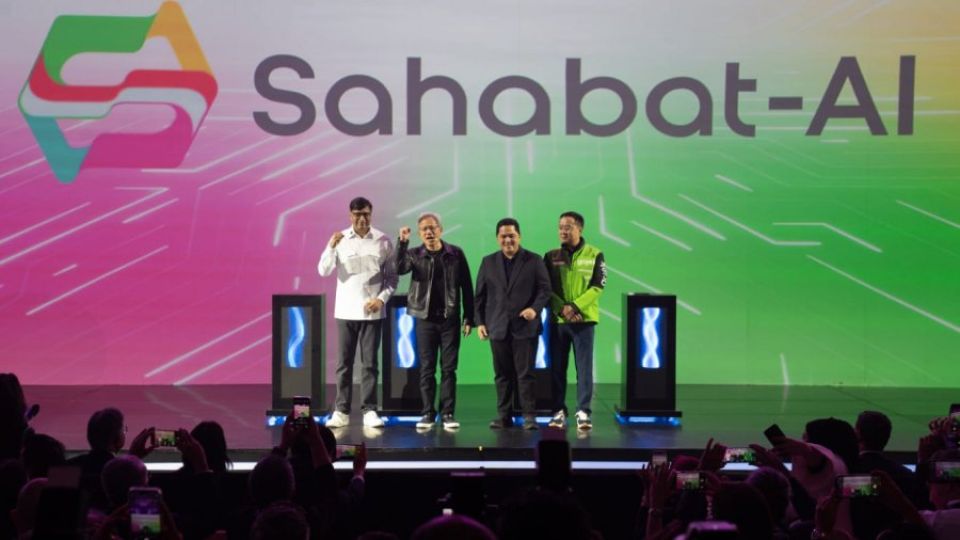November 18, 2024
JAKARTA – Nvidia Corporation CEO Jensen Huang pledged in a call with President Prabowo Subianto on Thursday to collaborate with Indonesian firms to develop artificial intelligence technology in the country, as he emphasized the importance of AI for industrial and societal advancement.
“You can count on Nvidia and all our friends here and all the technology companies that work with us here to help advance artificial intelligence and benefit the people of Indonesia,” he said during the call, as quoted by Antara.
The call took place while Huang was on stage for a panel discussion at the Indonesia AI Day event in Jakarta. Prabowo, meanwhile, had just landed in Peru to attend the Asia-Pacific Economic Cooperation (APEC) Summit in Lima.
Prabowo said Nvidia was an important part of the country’s future, highlighting the significant impact and immense potential of AI, and invited Huang to meet him in person in the future
“I hope that your group, your company, considers Indonesia [a potential partner]. Please consider that we all welcome you with open arms,” Prabowo added.
Alex Yao, co-head of Asia Pacific technology, media and telecommunications equity research at JP Morgan, said on Thursday that “the only thing” that would define consumer behavior or corporate activity in the next few years was AI.
The technology would drive significant changes in transportation, where robotaxi business models would take hold, as well as in daily activities of both consumers and corporations.
Nvidia has become a powerhouse in AI development by leveraging its advanced graphics processing unit (GPU) technology, initially developed for gaming, as a foundation for the data-intensive processing needs of AI.
This success has not only pushed up Nvidia’s stock price on the NASDAQ to make the United States-based semiconductor firm the world’s most valuable company but has also made Huang one of the richest people on the planet.
Indonesia was also a stop on last year’s global tour of OpenAI CEO Sam Altman, who rose to fame with the launch of the ChatGPT language model in 2022. Altman used the opportunity to “meet with policymakers”, inviting them to take part in the process of determining benchmarks for AI deployment.
Read also: Nvidia overtakes Apple as world’s most valuable company
During the event, local telecommunications firm Indosat Ooredoo Hutchison (IOH) and tech giant PT GoTo Gojek Tokopedia announced the first phase of development of an open-source large language model (LLM) for Indonesian, called Sahabat-AI.
One of the initial use cases is Hippocratic AI, a safety-focused LLM for health care that will incorporate Sahabat-AI models for Indonesian users.
IOH is set to support the initiative through its AI cloud service, which also uses NVIDIA GPUs. In May, IOH announced it would offer AI cloud services to public and private enterprises in the country through its subsidiary Lintasarta, with the first batch of 1,000 NVIDIA GPUs arriving in July.
The collaboration, which is also supported by AI Singapore and India’s Tech Mahindra, uses NVIDIA AI Enterprise software to train the model and enhance its language understanding.
In December of last year, AI Singapore said that while American generative AI applications such as OpenAI’s ChatGPT, Meta’s Llama and Google’s Bard were available for use in almost every country, research remained focused on the English language and Western cultures.
A greater cultural distance from the US means generative pre-trained transformers (GPT) will typically produce less culturally aligned, and perhaps less human-like, responses.
Thus, industry experts have pointed to the need for AI systems to be trained on local data to adapt to local linguistic nuances and demands.
Beside IOH and GoTo, the Singapore-based research center is also collaborating with Indonesia’s National Research and Innovation Agency (BRIN) and Collaboration for Research and Innovation in Artificial Intelligence (KORIKA), alongside local start-ups Glair.ai and Datasaur.ai, both portfolio companies of the Jakarta-based GDP Ventures.
Read also: Indosat to launch Indonesian-language model for AI in July
IOH president director Vikram Sinha claimed Sahabat-AI supported the country’s development vision by allowing digital sovereignty and inclusivity at the same time.
He said creating an AI model that spoke the local language and reflected local culture would empower every Indonesian to harness the technology’s potential.
“Sahabat-AI launches Indonesia’s AI journey and showcases how LLMs can be tailored to serve unique linguistic and cultural needs. Indonesia’s culture of gotong royong, or mutual collaboration, demonstrates how industry, researchers and the public sector can come together to help every nation use AI to advance development,” Nvidia’s Huang stated.


